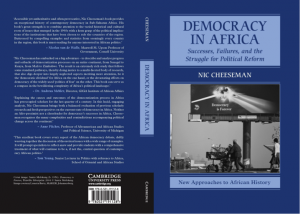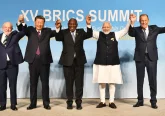Democracy in Africa: Successes, Failure and the Struggle for Political Reform testifies to the ability of African states
 to democratize against the odds. It effectively introduces a framework for understanding how leaders choose to respond to the pressure to liberalize their political systems, covering the recent history of African politics and providing great detail on the return of multiparty politics in Africa since the early 1990s. In this Q&A, Ian Cooper of the Department of Politics and International Studies (POLIS) at the University of Cambridge interviews Professor Nic Cheeseman, Associate Professor of African Politics, Jesus College, University of Oxford, on his recent publication.
to democratize against the odds. It effectively introduces a framework for understanding how leaders choose to respond to the pressure to liberalize their political systems, covering the recent history of African politics and providing great detail on the return of multiparty politics in Africa since the early 1990s. In this Q&A, Ian Cooper of the Department of Politics and International Studies (POLIS) at the University of Cambridge interviews Professor Nic Cheeseman, Associate Professor of African Politics, Jesus College, University of Oxford, on his recent publication.
- What do you think are the book’s principal contributions to the study of African democratization?
The book makes three main contributions. The first is that it places the return to multiparty politics in Africa of the 1990s in historical perspective. All too often, research on democracy in Africa ignores the fact that many states have been holding elections and running legislatures since independence. For example, civilian one-party states such as Kenya, Tanzania, and Zambia held one-party elections for Members of Parliament throughout the 1960s, 1970s and 1980s. In most cases, these elections were problematic and the legislatures they gave rise to proved unable to check the power of the president. However, I show that the very presence of these institutions, and the norms they gave rise to, played an important role in laying the foundations for a more democratic form of politics. In other words, the book helps to explain how the past shapes the present and the possibilities for the future.
The second contribution is that it brings the story of African democracy up to date and it does so for the whole continent. Some excellent books have been published on the transition to multiparty politics, but many are now dated. Democracy in Africa fills this gap by providing a lot of new information and data about some of the most pressing issues of the day, such as when leaders do and do not respect presidential term-limits and when elections do and do not lead to change. It also takes the diversity of Africa seriously, presenting examples from over 30 countries in the East, West, Central and South of the continent, carefully selected to reflect the legacy of British, French, and Portuguese colonial rule. In doing so, I hope to avoid homogenizing Africa’s experience with democracy and to remind readers that Africa is not a country!
The third main contribution of the book is to provide a framework for understanding how leaders choose to respond to the pressure to liberalize their political systems. A lot of the research on Africa has emphasized the extent to which democratic progress depends on whether individual leaders are willing to support reform or not. I try and go beyond this by explaining the conditions under which leaders are more likely to respond to calls to democratize with reform rather than repression. In doing so, I demonstrate that while African leaders may be able to make their own history, they do not do so under conditions of their own choosing.
- Are you a ‘demo-optimist’ or a ‘demo-pessimist’?
I hope that I am a ‘demo-realist’ but I think most people would put me in the more optimistic camp. In part, this is because I deliberately I set out to write a book that did not just repeat the standard critiques and complaints about democracy in Africa. Instead, I wanted to tell the other, often ignored, side of the story. In other words, I was frustrated with the headlines always being about conflict, civil war and democratic breakdown in places like Cote d’Ivoire and the Democratic Republic of Congo. One of the things that makes Democracy in Africa distinctive is that it gives equal billing to the continent’s democratic success studies such as Benin, Ghana and Senegal.
When you focus on these more positive cases, which are often ignored precisely because they are fairly stable, the picture looks very different. Countries such as Benin and Ghana have made tremendous progress in the last twenty years – as did Botswana and Mauritius in the previous 50 – and testify to the ability of African states to democratize against the odds. By focusing on these stories and explaining how they were possible, I arrive at a more optimistic interpretation of the process of democratization in Africa.
- Does the recent electoral turnover in Nigeria support Lindberg’s argument about the democratizing power of elections?
In 2006, Staffan Lindberg published his influential argument that the repeated holding of elections increases the quality of democracy in a country, measured in terms of respect for civil liberties, even if the elections are not fully free and fair. He suggested that this was because elections train voters in ‘democratic arts’ while creating opportunities for pro-reform coalitions to come together to push for reform. Although Lindberg marshalled a large dataset to support his conclusions, his findings have remained controversial.
Transfers of power, such as the victory of the opposition All Progressives Congress in Nigeria in 2015, lend credibility to Lindberg’s theory. In that case, the performance of the electoral commission and the quality of elections increased from 2007 to 2015, which in turn created the conditions for an opposition victory – something that appeared implausible just a decade earlier. However, we also need to refine Lindberg’s argument because while repeatedly holding elections may promote democratization, the quality of elections does matter. When elections fall below a certain threshold, they can do more harm than good – something that Lindberg himself has recognized in his most recent research on this topic, which is soon to be published in a collection of articles on African politics that I am editing for Cambridge University Press.
- Where do you stand on the issue of ‘democratic sequencing’?
The argument that democratic reforms should be sequenced, so that countries only try and introduce multiparty politics when they have an effective state, a harmonious society and a strong economy is very seductive. Given that introducing competitive elections often results in political instability and violence, it is tempting to think that democratization should only be attempted once a country has already established a strong social, political and economic foundation.
However, this argument is far less persuasive in the African context for two main reasons. First, pretty much all of the continent is now holding multi-party elections, and support for democracy within African societies remains high. Given this, returning the continent to some kind of benign dictatorship is not really viable. Second, there is no historical evidence that such a strategy would work on the continent. In the 1970s and 1980s, many African states featured civil-authoritarian governments that were committed to building stronger states and promoting development. Yet most failed on both counts because the combination of divide-and-rule politics and high levels of corruption led to economic stagnation and mounting social tensions. It is not clear to me that reintroducing these kinds of political systems today would generate better results.
Indeed, the best performing states in the 1970s and 80s – in terms of both nation-building and economic performance – were not the authoritarian ones, but the more democratic political systems such as Botswana and Mauritius. To my mind, it makes more sense to learn from these more positive examples rather than to try and recreate some form of benign dictatorship that has rarely been successful in Africa in the long-run.
- As political scientists, we tend to believe that structural forces play an important role in facilitating or preventing democratic consolidation. But how much agency do African presidents have in this regard?
That’s a great question! My answer is that leaders can make a remarkable difference to whether a country becomes a democracy but, as I noted earlier, they do not operate under conditions of their own choosing. What I mean by this is that even if a given leader decides to respond to domestic and international pressure to reform by repressing the opposition, they may not be able to successfully pursue this course of action if the opposition is strong and united, key international partners are pushing for change, and the country is effectively bankrupt and cannot afford to pay the security forces. It is therefore a mistake to focus too heavily on the personality of the man (or occasionally woman) at the top. On this basis, the book argues that as well as thinking about the attitudes and ideas of individual leaders – the Kenyattas, Mugabes and Zumas – we need to understand the structural forces that shape what they can and cannot do. After all, politics in Africa, as elsewhere, is the art of the possible.
Democracy in Africa: Successes, Failure and the Struggle for Political Reform is available on Amazon.com. Further information on this publication can be accessed here.







